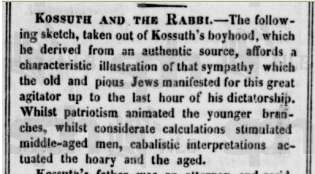(If you think periodicals reprint stories and items from each other too much these days, you haven't read too many 19th century periodicals. This story was originally in the Jewish Chronicle Dec. 14, 1849 (pp. 77-78), and republished in many British newspapers until it reached the Straits Times of Singapore in 1851.)
The story concerns Hungarian revolutionary and hero Lajos Kossuth (1802-94), who was beloved by Jews for his fair and enlightened attitude toward the Jews (see here for the Occident's coverage of him in 1849 which gives a flavor of the enthusiasm he had roused in Hungarian Jews - including the very frum ones).
In the story, Kossuth's father, an attorney (like him) was involved in a very contentious lawsuit against Rabbi Moshe Teitelbaum (who is unnamed here). During this period, two sons of the elder Kossuth died and indeed he himself died. The rumor spread that this happened because the Yismach Moshe cursed him. It so frightened people that the widow, and mother of the last remaining son, visited him to request a blessing for him. After conversing with the boy, and apparently liking what he saw, the Rebbe placed his hands on his head and blessed him, applying the words of Psalam 60:6 to him and punning on his name: נָתַתָּה לִּירֵאֶיךָ נֵּס לְהִתְנוֹסֵס מִפְּנֵי קֹשֶׁט סֶלָה, "Thou hast given a banner to them that fear Thee, that it may be displayed because of the truth. Selah."



An interesting story concerning Kossuth was printed in a recent edition of the history journal of the Belzer chasidim, Or Hatzofun.
ReplyDeleteThe children of Rabbi Sholem of Belz visited Rabbi Yisroel Friedman of Ruzin at the time when Kossuth was agitating for Hungarian independence. Hungary was at that time ruled by Austria and Russia had intervened to support Austria against Hungarian independence.
The Ruziner asked the Belzer's children to request their father to pray for the success of Kossuth. Probably due to Kossuth's pro-Jewish stance but the Ruziner had also been imprisoned by the Russians so he would have had little sympathy for their allies.
When the request was passed on to the Belzer he replied that while he agrees with the sentiments 'I cannot bring myslef to pray for a mechutzef to succeed.'
The story is a classic for the way the internal governance of chasidic movements shapes the general weltanschauung of its leaders. One wonders what he would have made of 'mechutsofim' from the suffragettes to the recent Nobel peace prize winner in China.
It took me awhile until I began to grasp that they really did prefer despots to democracy. Actually, that's how you know Israel and the Israeli government isn't really goyish and isn't really despotic.
ReplyDelete"One wonders what he would have made of 'mechutsofim' from the suffragettes to the recent Nobel peace prize winner in China."
ReplyDeleteMost probably, the Belzer Rebber was referring to Kossuth's personal demeanor and character rather than to the fact that he was agitating against the status quo. Kossuth, though he accomplished good things and was tolerant towards Jews, was known as being condescending towards non Magyars and personally somewhat arrogant.
While acknowledging that this is only a guess, I find the suggestion that it was solely about character to be implausible. Were all the despots and monarchs humble people? I doubt it. It seems to me that the height of chutzpah is to foment revolution against a government properly constituted (i.e., already in power).
ReplyDeleteMost interesting post. The story resonated with me because the Yismach Moshe is somewhere up there in my family tree, and my Hungarian grandfather was certainly a fan of "Kossuth Lojos."
ReplyDeleteSorry, "Lajos." I was spelling it phonetically.
ReplyDelete"Were all the despots and monarchs humble people?"
ReplyDeleteThere is no reason to think that the Belzer Rebbe prayed for them, either, beyond the basic requirement to pray for "sh'lom malchuth" (which doesn't refer to individual leaders) or the frequent political necessity to publicly pray for the welfare of individuals in power.
It takes chutzpah to foment a revolution, but that type of chutzpah is independent of the flaw in character that would characterize someone as a "mechutzaf". In other words, a revolutionary leader might be a humble person who acts boldly when necessary.
According to Anonymous' story, the Belzer Rebbe "agree[d] with the sentiments" of the pro-Kossuth crowd. This suggests to me that he agreed in principle but felt uncomfortable praying for him because of Kossuth's personality.
I looked up the source this time (Or Hatzofun, issue 24, Av 5770, page 111). The story was narrated by Reb Aharon of Belz to Reb Mordechai Sholem Yosef of Sadigura-Psemysl. They write that the Ruziner supported Kossuth because he 'hated' the Russian empire as he had suffered at its hands.
ReplyDeleteThe Ruziner sent a message to the Belzer (sorry, it doesn't say with his sons) asking him to pray that 'Kossuth should succeed in his revolt'. To which the Belzer replied:
איך האַלט אויך אַזוי נאָר איך קען נישט דאַווענען אַז אַ מחוצף זאָל זיגן
('I agree but I cannot pray that a 'mechutsef' should succeed')
It takes chutzpeh to fight for what you believe in whether you are a nationalist independence fighter or a campaigner for democracy, human rights, freedom of speech or rule of law. Unfortunately such campaigners are not the usual bed fellowes of chasidic rebbes.
Incidentally this is the same Rabbi Sholem of Belz who gave a warm hagiographic speech in praise of an Austrian emperor whose name escapes me. (It may have been Franz Joseph after an assasination attempt on him or possibly some other celebration.) He also had a chasid by the name of Mordechai Pelz who is reputed to have been well connected in the Viennese court. It may therefore be that he felt unable to pray for Kossuth for more than one reason and he didn't want to offend the Ruziner.